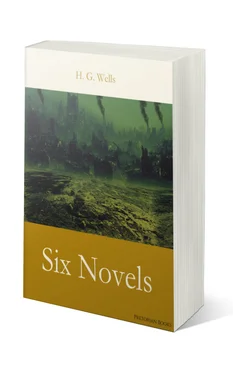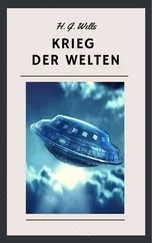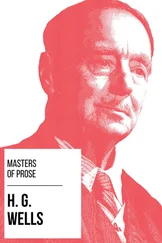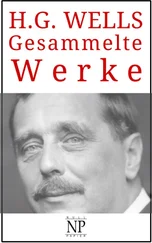H. Wells - H. G. Wells - Six Novels
Здесь есть возможность читать онлайн «H. Wells - H. G. Wells - Six Novels» — ознакомительный отрывок электронной книги совершенно бесплатно, а после прочтения отрывка купить полную версию. В некоторых случаях можно слушать аудио, скачать через торрент в формате fb2 и присутствует краткое содержание. Жанр: unrecognised, на немецком языке. Описание произведения, (предисловие) а так же отзывы посетителей доступны на портале библиотеки ЛибКат.
- Название:H. G. Wells: Six Novels
- Автор:
- Жанр:
- Год:неизвестен
- ISBN:нет данных
- Рейтинг книги:3 / 5. Голосов: 1
-
Избранное:Добавить в избранное
- Отзывы:
-
Ваша оценка:
- 60
- 1
- 2
- 3
- 4
- 5
H. G. Wells: Six Novels: краткое содержание, описание и аннотация
Предлагаем к чтению аннотацию, описание, краткое содержание или предисловие (зависит от того, что написал сам автор книги «H. G. Wells: Six Novels»). Если вы не нашли необходимую информацию о книге — напишите в комментариях, мы постараемся отыскать её.
H. G. Wells: Six Novels — читать онлайн ознакомительный отрывок
Ниже представлен текст книги, разбитый по страницам. Система сохранения места последней прочитанной страницы, позволяет с удобством читать онлайн бесплатно книгу «H. G. Wells: Six Novels», без необходимости каждый раз заново искать на чём Вы остановились. Поставьте закладку, и сможете в любой момент перейти на страницу, на которой закончили чтение.
Интервал:
Закладка:
“He is dead,” said a deep, vibrating voice.
“He is not dead; he is not dead,” jabbered another.
“We saw, we saw,” said several voices.
“Hullo!” suddenly shouted Montgomery, “Hullo, there!”
“Confound you!” said I, and gripped my pistol.
There was a silence, then a crashing among the interlacing vegetation, first here, then there, and then half-a-dozen faces appeared,—strange faces, lit by a strange light. M'ling made a growling noise in his throat. I recognised the Ape-man: I had indeed already identified his voice, and two of the white-swathed brown-featured creatures I had seen in Montgomery's boat. With these were the two dappled brutes and that grey, horribly crooked creature who said the Law, with grey hair streaming down its cheeks, heavy grey eyebrows, and grey locks pouring off from a central parting upon its sloping forehead,—a heavy, faceless thing, with strange red eyes, looking at us curiously from amidst the green.
For a space no one spoke. Then Montgomery hiccoughed, “Who—said he was dead?”
The Monkey-man looked guiltily at the hairy-grey Thing. “He is dead,” said this monster. “They saw.”
There was nothing threatening about this detachment, at any rate. They seemed awestricken and puzzled.
“Where is he?” said Montgomery.
“Beyond,” and the grey creature pointed.
“Is there a Law now?” asked the Monkey-man. “Is it still to be this and that? Is he dead indeed?”
“Is there a Law?” repeated the man in white. “Is there a Law, thou Other with the Whip?”
“He is dead,” said the hairy-grey Thing. And they all stood watching us.
“Prendick,” said Montgomery, turning his dull eyes to me. “He's dead, evidently.”
I had been standing behind him during this colloquy. I began to see how things lay with them. I suddenly stepped in front of Montgomery and lifted up my voice:—“Children of the Law,” I said, “he is not dead!” M'ling turned his sharp eyes on me. “He has changed his shape; he has changed his body,” I went on. “For a time you will not see him. He is—there,” I pointed upward, “where he can watch you. You cannot see him, but he can see you. Fear the Law!”
I looked at them squarely. They flinched.
“He is great, he is good,” said the Ape-man, peering fearfully upward among the dense trees.
“And the other Thing?” I demanded.
“The Thing that bled, and ran screaming and sobbing,—that is dead too,” said the grey Thing, still regarding me.
“That's well,” grunted Montgomery.
“The Other with the Whip—” began the grey Thing.
“Well?” said I.
“Said he was dead.”
But Montgomery was still sober enough to understand my motive in denying Moreau's death. “He is not dead,” he said slowly, “not dead at all. No more dead than I am.”
“Some,” said I, “have broken the Law: they will die. Some have died. Show us now where his old body lies,—the body he cast away because he had no more need of it.”
“It is this way, Man who walked in the Sea,” said the grey Thing.
And with these six creatures guiding us, we went through the tumult of ferns and creepers and tree-stems towards the northwest. Then came a yelling, a crashing among the branches, and a little pink homunculus rushed by us shrieking. Immediately after appeared a monster in headlong pursuit, blood-bedabbled, who was amongst us almost before he could stop his career. The grey Thing leapt aside. M'ling, with a snarl, flew at it, and was struck aside. Montgomery fired and missed, bowed his head, threw up his arm, and turned to run. I fired, and the Thing still came on; fired again, point-blank, into its ugly face. I saw its features vanish in a flash: its face was driven in. Yet it passed me, gripped Montgomery, and holding him, fell headlong beside him and pulled him sprawling upon itself in its death-agony.
I found myself alone with M'ling, the dead brute, and the prostrate man. Montgomery raised himself slowly and stared in a muddled way at the shattered Beast Man beside him. It more than half sobered him. He scrambled to his feet. Then I saw the grey Thing returning cautiously through the trees.
“See,” said I, pointing to the dead brute, “is the Law not alive? This came of breaking the Law.”
He peered at the body. “He sends the Fire that kills,” said he, in his deep voice, repeating part of the Ritual. The others gathered round and stared for a space.
At last we drew near the westward extremity of the island. We came upon the gnawed and mutilated body of the puma, its shoulder-bone smashed by a bullet, and perhaps twenty yards farther found at last what we sought. Moreau lay face downward in a trampled space in a canebrake. One hand was almost severed at the wrist and his silvery hair was dabbled in blood. His head had been battered in by the fetters of the puma. The broken canes beneath him were smeared with blood. His revolver we could not find. Montgomery turned him over. Resting at intervals, and with the help of the seven Beast People (for he was a heavy man), we carried Moreau back to the enclosure. The night was darkling. Twice we heard unseen creatures howling and shrieking past our little band, and once the little pink sloth-creature appeared and stared at us, and vanished again. But we were not attacked again. At the gates of the enclosure our company of Beast People left us, M'ling going with the rest. We locked ourselves in, and then took Moreau's mangled body into the yard and laid it upon a pile of brushwood. Then we went into the laboratory and put an end to all we found living there.
XIX. MONTGOMERY'S “BANK HOLIDAY.”
WHEN this was accomplished, and we had washed and eaten, Montgomery and I went into my little room and seriously discussed our position for the first time. It was then near midnight. He was almost sober, but greatly disturbed in his mind. He had been strangely under the influence of Moreau's personality: I do not think it had ever occurred to him that Moreau could die. This disaster was the sudden collapse of the habits that had become part of his nature in the ten or more monotonous years he had spent on the island. He talked vaguely, answered my questions crookedly, wandered into general questions.
“This silly ass of a world,” he said; “what a muddle it all is! I haven't had any life. I wonder when it's going to begin. Sixteen years being bullied by nurses and schoolmasters at their own sweet will; five in London grinding hard at medicine, bad food, shabby lodgings, shabby clothes, shabby vice, a blunder,—I didn't know any better,—and hustled off to this beastly island. Ten years here! What's it all for, Prendick? Are we bubbles blown by a baby?”
It was hard to deal with such ravings. “The thing we have to think of now,” said I, “is how to get away from this island.”
“What's the good of getting away? I'm an outcast. Where am I to join on? It's all very well for you, Prendick. Poor old Moreau! We can't leave him here to have his bones picked. As it is—And besides, what will become of the decent part of the Beast Folk?”
“Well,” said I, “that will do to-morrow. I've been thinking we might make the brushwood into a pyre and burn his body—and those other things. Then what will happen with the Beast Folk?”
“I don't know. I suppose those that were made of beasts of prey will make silly asses of themselves sooner or later. We can't massacre the lot—can we? I suppose that's what your humanity would suggest? But they'll change. They are sure to change.”
He talked thus inconclusively until at last I felt my temper going.
“Damnation!” he exclaimed at some petulance of mine; “can't you see I'm in a worse hole than you are?” And he got up, and went for the brandy. “Drink!” he said returning, “you logic-chopping, chalky-faced saint of an atheist, drink!”
Читать дальшеИнтервал:
Закладка:
Похожие книги на «H. G. Wells: Six Novels»
Представляем Вашему вниманию похожие книги на «H. G. Wells: Six Novels» списком для выбора. Мы отобрали схожую по названию и смыслу литературу в надежде предоставить читателям больше вариантов отыскать новые, интересные, ещё непрочитанные произведения.
Обсуждение, отзывы о книге «H. G. Wells: Six Novels» и просто собственные мнения читателей. Оставьте ваши комментарии, напишите, что Вы думаете о произведении, его смысле или главных героях. Укажите что конкретно понравилось, а что нет, и почему Вы так считаете.












